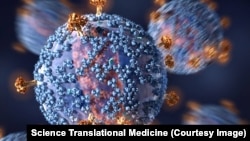An experimental treatment providing a new approach in the fight against HIV has cleared the first hurdle.
VRC01 is a so-called monoclonal antibody, a relatively recent development in the arsenal of bioengineered therapies.
Monoclonal antibodies are similar to the antibodies produced by the human immune system, which are proteins that go after and destroy disease-causing organisms. But monoclonal drugs contain antibodies explicitly engineered by scientists to target a specific disease.
They now include drugs designed to suppress the immune system so autoimmune diseases such as multiple sclerosis and ulcerative colitis can be treated, and rev up the body's natural defenses to fight cancer.
While they don't always result in a cure, in many instances, monoclonal antibodies significantly slow disease progression.
In an early clinical trial involving just over 20 HIV-infected individuals, VRC01 was extremely effective in attacking and destroying the AIDS virus.
"It was safe,” said Anthony Fauci, director of the U.S. National Institute of Allergy and Infectious Diseases, whose scientists designed the HIV antibody. “There were no problems with doing it. And (number) two, it temporarily decreased the level of virus in the people who were not receiving anti-retroviral therapy."
Trial details
He says there was no response in the 15 patients who were taking anti-AIDS drugs, perhaps because that therapy had already driven the virus down to virtually undetectable levels.
But among the others, an infusion of VRC01 totally knocked out the virus for 20 days in two participants. Others saw their virus load significantly drop for up to three weeks. However, a couple of patients in this group saw no effect, and scientists determined they were infected with drug-resistant strains of HIV.
The results were published in the journal Science Translational Medicine.
Since the virus re-emerged a few weeks after treatment, Fauci says future trials will look at whether HIV can be suppressed with repeat infusions.
"This is an important first step toward determining the feasibility of using monoclonal antibodies for prevention and treatment of HIV," he said.
Researchers have not ruled out using VRC01 to shield high-risk individuals against HIV infection.
Fauci says it's likely the second phase of clinical trials — further testing the safety and effectiveness of the anti-AIDS monoclonal antibody — will take place next year.





